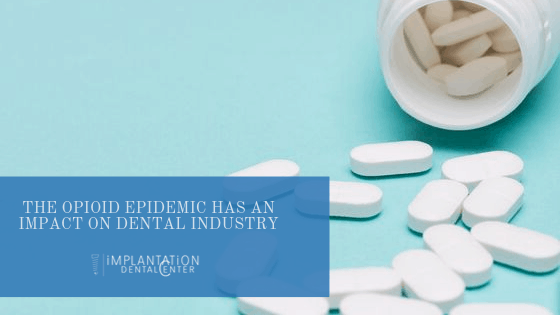The opioid crisis has affected the dental industry, just as it has other medical professions. This growing, dangerous addiction to pain-pills is widespread throughout the country. The problem isn’t limited to the patients receiving the prescription. Patients have to worry about their family members, especially teenagers, taking their pain killers and becoming addicted or engaging in risky behavior. As a result, dental professionals are cutting back on prescribing opioids to their patients, even after treatments.
Prior to understanding the effects and addictive nature of opioids, they were widely prescribed by health professionals. After each procedure, dentists would prescribe the amount needed to minimize pain for a few days. This was completely acceptable before evidence of the dangerous epidemic emerged. The dental industry itself was responsible for 15.5% of opioid prescriptions in 1998. Since then, the number of prescriptions written has drastically decreased.
The dental industry is actually one of the leading industries in the reduction of opioid prescriptions written. The ADA and CDC have both created regulations to combat the epidemic. These have resulted in a shorter length of prescriptions and lower dosages.
This change has caused the dental industry to come up with new, safer alternatives to pain-killers after procedures. In the past, opioid prescriptions were written as a preventative measure against post-procedural pain. Now that the effects are better understood, dental professionals are prescribing them solely as necessary to treat pain, not as a backup method.
Instead, they are embracing non-prescription alternatives such as ibuprofen. This has actually been a more effective solution to the pain in many cases. Its anti-inflammatory quality is much better suited to treat inflammation and discomfort after treatments. In many ways, it’s stopping the cause of the pain rather than masking it.
While the thought of undergoing a procedure with a potentially painful recovery process may seem scary, but in reality, there are many alternatives to opioids for pain relief post-procedure and even during the procedure.
Some dentists are using non-opioid local anesthetics during procedures. These work by blocking the nerve impulses at the incision site rather than opioids which attach themselves to opioid receptors in the brain creating an effect that mimics a runner’s high.
This same local anesthetic is also used after the procedure to prevent pain. It is injected at the end of surgery and the effects can last for three to four hours after. After that, the patient can take an over the counter inflammatory to minimize lingering pain.
This alternative to opioids is best because the administration is controlled by the dentist and it’s non-addictive as opioids are. Rather than prescribing up to 20 pain pills, the patient will leave the office with the pain remedy already in the painful site. It’s easier for the patient and the dental professional.
The dental profession has embraced opioid alternatives that will create a better experience for patients without creating a more painful recovery post-procedure. While the opioid epidemic may continue to be a problem in other health professions, patients can rest assured that they will not have to worry about the risk of addiction after the procedure.
Call our office today to learn more about post-procedure pain management options.



